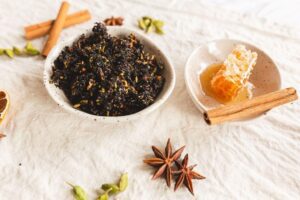A group of Belgian researchers endeavoured to answer a simple question – does bad food enable depression, or is it the other way around?
In desperate need of something optimistic to write about, I came across a poo-story I think you will like. Especially because it also has to do with depression and how to help people who are suffering from this disease. The new black in science at the moment is the microbiome, the colony of billions of bacteria, viruses and fungi that live in and on us. Especially the gut microbiome has come under the microscope, because it functions as our “bacterial fingerprint”. Your gut is you, in a way, and some experts are even talking about the gut as “our second brain”.
One of the functions of the microbiome is to make chemicals that influence your body and probably also your brain. So far, most research into how that works has been done on mice in laboratories, but recently, the Belgian University of Leuven published the results of a large survey into humans, the first one in the world. What they found could change the way we deal with depression, in particular, forever: people who are depressed lack a particular kind of gut bacteria that non-depressed people have in abundance.
This is what the researchers, led by Professor Jeroen Raes, did. First of all, they got three groups of people together. One consisted of 1,054 Belgians, who generously donated poo-samples to Raes’ Flemish Gut Flora Project. Then there were a little over 1,000 Dutch people, and a third, very special group of patients of the depression clinic at the university’s hospital, who did the same.
After analysing everybody’s sample, the team found that if people had been diagnosed with clinical depression, two bacteria called Dialister and Coprococcus were missing or barely there. This was very different in people who were not depressed: they had a large amount of those same bacteria. Of course, now causality became the issue: “What we don’t know,” said Raes, “is if depression changes the bacteria or the other way around.”
So that is what they are looking at at the moment. Raes has two theories, though. The first one has to do with inflammation. “We know that the bacteria in question produce butyrate, an acid that diminishes inflammations in the gut. So it could be that without those bacteria, inflammation can get out of hand more easily. We know that depression often coincides with an inflammation in the brain. So we think that these two might be linked.” The second theory revolves around the things that gut bacteria produce. Microbes in our gut make substances that influence the brain, like dopamine, serotonin, acetylcholine and gamma-aminobutyrate.
They are substances that make it possible for nerve cells in our brain to communicate with each other. One of the missing bacteria connected to depression, Coprococcus, is important in the fabrication of dopamine. So, it is possible that low levels of Coprococcus means low levels of dopamine in the brain. Most of us know dopamine as the feel-good hormone. But dopamine is more than that: a chemical that is involved in many pathways in the brain, playing a role in sleep, learning, memory, concentration. Too little dopamine can lead to Parkinson’s disease, too much is linked to schizophrenia.
“People sleep better, have less fluctuating weight, can concentrate better,” Molendijk said. Nevertheless, people who eat well get diagnosed. And again, we don’t know if bad food causes depression or the other way around.
If Raes is right, then a lack of bacteria in the gut might cause depression. And if that is the case, scientists can start producing a new generation of probiotica, that can help clean up our gut flora and make it healthy again. There are already companies who are focusing on producing those probiotica.
Not just to help with depression, but also with illnesses like Irritable Bowel Syndrome. And that is extra interesting, because we know that 50% of patients with Irritable Bowel Syndrome also have a diagnosis of clinical depression. Given the results of the Belgian study, it is likely that those two are connected.
At the moment we don’t know why the gut flora of people with depression is different from healthy people. It could be food, of course. In 2017, Dutch researcher Marc Molendijk looked at the results of 24 international studies into the link between food and depression. He concluded that a healthy diet (lots of veg, fruit, grains, fibre and fish) helps with depression. “People sleep better, have less fluctuating weight, can concentrate better,” he said. Nevertheless, even people who eat well get diagnosed with depression, almost as often as people who eat crap. And again, we don’t know if bad food causes depression or the other way around.
We’ve suspected that there is a connection between the gut biome and depression since 2011, when John Cryan of the University of Cork, Ireland, did research on mice without a microbiome. They turned out to be more stressed, more fearful and less social than their healthy peers.
When Cryan gave them Lactobacillus rhamnosus, a particular gut bacteria, their stress levels went down, they were less fearful and less depressed. Cryan also found that the connection between gut and brain went through the nervus vagus, a nerve that runs from the gut to the brain. When he cut it, the mice remained stressed and scared, even after the dose of Lactobacillus.
But mice aren’t humans, which is why the study by Professor Raes and his colleagues is so important. Maybe, if his gut feeling (pun intended) is right, he might have found at least a partial solution to the menace of depression.
About the author:
After migrating from Holland fifteen years ago and being warned by the Immigration Department against doing her job as a journalist, Ingeborg van Teeseling became a historian instead. She endeavours to explain Australia to migrants new and old at her website www.australia-explained.com.au, and runs www.lifebooks.com.au, telling people’s life stories.
For this story I have used the following sources:
www.foodandmoodcentre.com.au
www.nrc.nl
www.nature.com
www.universityhealthnews.com
www.imedpub.com



